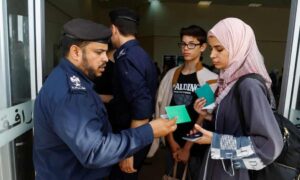
The last thing Rania sold was her jewellery. In the weeks after her family first woke up to heavy shelling in northern Gaza, they lost everything as they journeyed south to escape the bombs. “Wherever we went, the houses would be destroyed,” she says. “We were sent running from place to place.”
After three long months, she found herself in the border city of Rafah parting with her rings, gold bracelets and necklaces to pay the $15,000 “coordination fees” needed to get her family on the evacuation list to leave Gaza.
In January, Rania entered Egypt through the Rafah crossing, the only remaining route out of the coastal exclave. Since war broke out in the wake of the Hamas attack on 7 October, the Egyptian authorities say more than 83,000 people have left Gaza. Most have since travelled to other countries, but activists say there may be thousands of Palestinians sheltering in Egypt, despite the absence of any centralised relief effort. Unlike in neighbouring countries, no UN body has taken responsibility for Palestinians who have fled to Egypt, while Egyptian authorities stand accused of profiting from high border-crossing fees.
Rania and her family are relying on grassroots charities to help them pay for food and rent for an apartment in Cairo. It stands in sharp contrast to her old life when, Rania says, she was the one people came to for support. Her husband earned a good salary working for an aid organisation – they owned two houses, two cars, and her children attended university. The family spent nights out in restaurants and cafes. In the summer, they would drive to the beach.
A week into the war, Israeli forces dropped leaflets on Rania’s neighbourhood giving them 24 hours’ notice to leave the area. The family decided to leave, setting off south, sheltering with strangers on the way. Three weeks into their journey, they were watching the news when they saw that their old neighbourhood had been hit. Their house had been destroyed in heavy bombing that claimed the lives of 20 of her extended family. “Those who survived were disabled,” Rania says. “Some of them lost arms. Some lost legs.”
When people in central Gaza were also ordered to evacuate, Rania’s family continued south, ending up in a tent in Rafah, from where she applied to cross into Egypt. She waited weeks for her request to be granted. Meanwhile, the bombs continued to fall. “People were dying all around us,” she says. “Anyone could die at any moment.”
While travel from Gaza into Egypt was initially orchestrated by multiple agencies charging wildly differing prices, a single company has since emerged with the monopoly on border crossings, charging a flat fee of $5,000 (£4,000) for an adult and $2,500 for each child.
